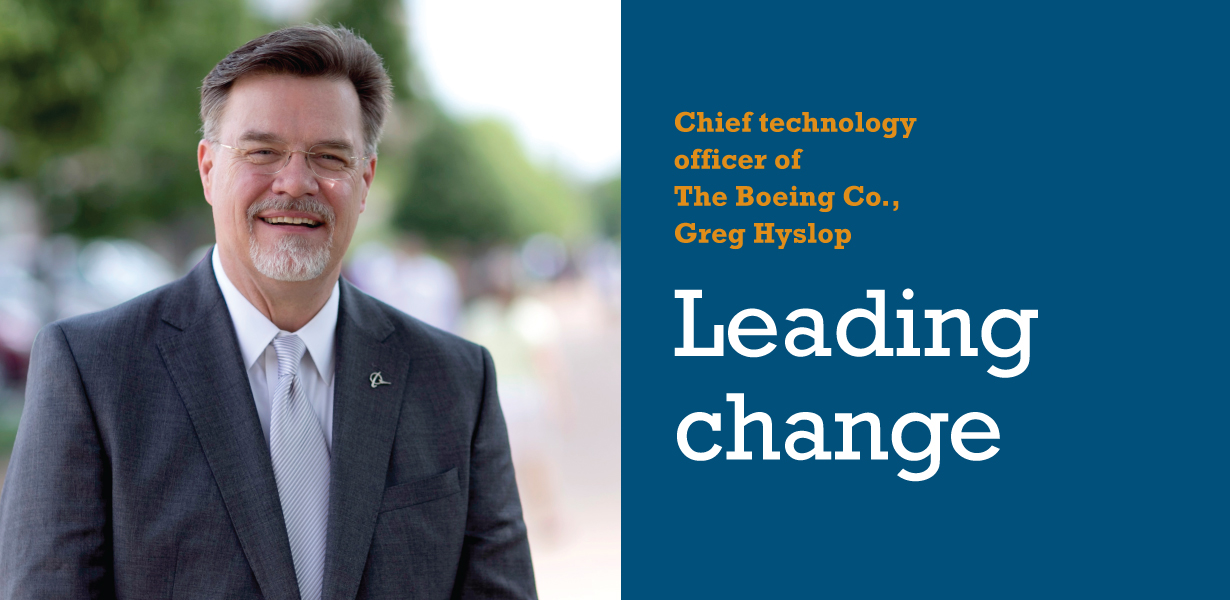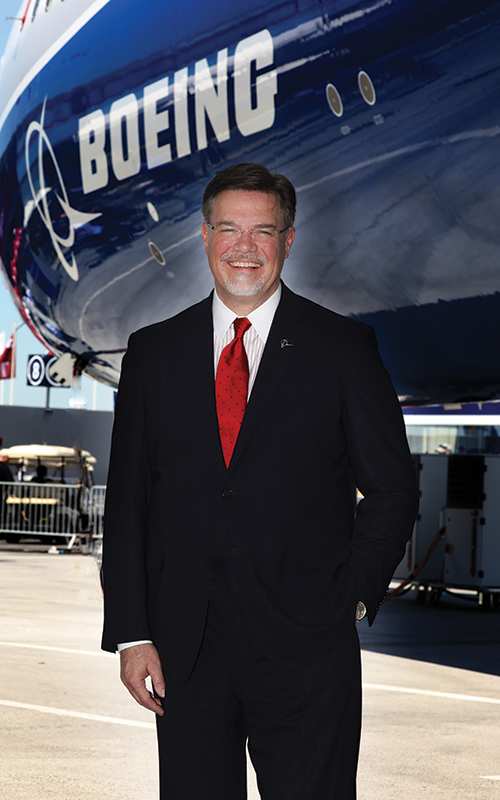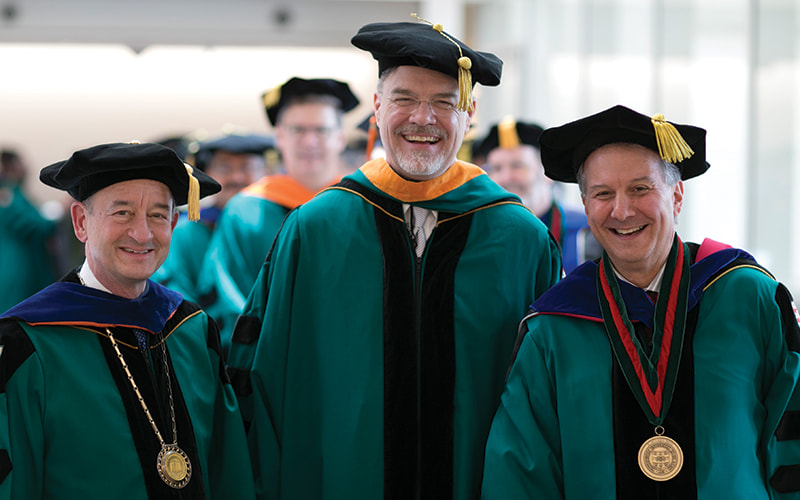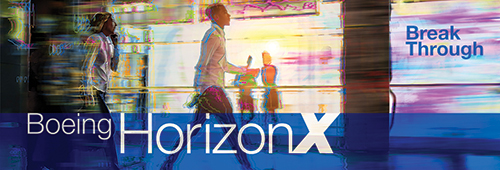Leading Change
As chief technology officer of The Boeing Co., Greg Hyslop oversees some 45,000 engineers who develop high-performance aircraft and space vehicles that change the world

It's a tall order, not only because of the effect of Boeing's products on society, but also because of the scope of his position, leading the technical team of the world's largest aerospace company, and the need to take on his one overarching challenge: to find what needs to change and lead that change. Yet it's a role Hyslop is managing deftly after advancing through various leadership positions over his 35-year career with the company.

While Hyslop's titles of CTO and senior vice president of the company's Engineering, Test & Technology organization may indicate he is waist-deep in the technical aspects of the business, he says technology is only part of what makes the company work.
“As CTO, I have to be looking for what we need to be doing for the future, the technologies that will define the future for us and who we need to be working with,” says Hyslop, who earned a doctorate in systems science & mathematics from the School of Engineering & Applied Science at Washington University in St. Louis in 1989. “You can’t do technology without the people element. That’s how it comes together.”
People are the key to change, says Hyslop, who is working to build a network of people throughout the company. After 31 years in Boeing's defense operations in St. Louis, Dallas and Huntsville, Alabama, and the past four in corporate roles, Hyslop has unique insight into the connections that need to be made among employees on the defense, space, services and commercial sides of Boeing's business.
"I feel like I'm a matchmaker," he says. "If I'm in a meeting with a lot of people, and I see two people I know, I'll tell them they need to know each other and introduce them to build those connections. That has been a fun part of being in the corporate jobs to be able to see that, because then cool things really start to happen."
That network of people includes longtime employees as well as the next generation. "Because of the function of engineering, I am looking at who we are bringing in and how that meshes with where we need to be technologically for the future," he says. "That's when the magic happens — when you've got people with experience working with people who are new and have new ideas. How do we successfully preserve the knowledge and experience of the people who'll be retiring and get that knowledge to the generation that's coming in?"
Boeing partners with top engineering schools such as the School of Engineering & Applied Science to bring in the next generation of engineers who will meet some of its challenges. More than 1,200 Engineering alumni are Boeing employees, and one-fourth of master's students are Boeing teammates, continuing a longstanding partnership between the school and the company, which includes joint research projects, a mentorship program, scholarships, internships and support of the Boeing Patent Challenge.

New ideas and staying ahead technologically are other keys to leading change in a global corporation with nearly 140,000 employees responsible for the safety of 4.5 million people who travel on Boeing airplanes and communicate via more than 60 Boeing satellites in orbit, Hyslop says.
"For us to stay competitive, there are things we have to change — in how we do things, how we design airplanes, how we build airplanes, and a number of things for us to stay on top," he says. "Technologically, artificial intelligence will change our industry and change the world, and we have to be ready for that in aerospace."
“There is so much technology that is developing so quickly in some of these areas that it is going to change life as we know it.”
Hyslop foresees a future with more autonomous vehicles and aircraft.
"In a lot of ways, having autonomous things flying is easier than autonomous things driving, because there is less to worry about in the air than on the ground," he said. "I think that will change our industry. I think we're about to enter another golden era of aerospace."
To continue its quest to stay ahead technologically, earlier this year the company launched Boeing HorizonX, an initiative under Hyslop's direction that invests in early-stage businesses and startups developing emerging technologies that complement Boeing's goals, seeks new business opportunities for the company's aerospace technology and assesses disruptive innovations and business strategies. Already, HorizonX has invested in several companies, including several that develop augmented or virtual reality and one that develops alternative propulsion aircraft, and has partnered with several other international companies that collectively have expertise in cutting-edge fields such as augmented or virtual reality, alternative propulsion aircraft and artificial intelligence.

In addition, Boeing recently announced plans to acquire Aurora Flight Sciences, a firm that specializes in autonomous systems technologies that enable advanced robotic aircraft for future aerospace applications and vehicles. The company also is sponsoring the GoFly Prize, a $2 million competition to prompt creation of flying objects, such as jet packs, hoverboards and drones to transport individuals. Hyslop said in news reports that the idea is a good opportunity for small teams with limited resources, for the company to attract new talent and for the United States to continue as the leader in aerospace innovation.
With Hyslop's responsibilities comes an innate sense of the love of learning and discovery, which he has had since his graduate student days under the direction of TJ Tarn, now senior professor of electrical & systems engineering at WashU and director of the Center for Quantum Information Science and Technology at Tsinghua University in Beijing. Hyslop earned the doctorate while working full-time at what was then McDonnell Douglas, now part of Boeing, and supporting a young family.
"I always appreciated that they had my best interest in mind as I went through the program," Hyslop says. "There was a strong sense of community at WashU and a strong tie to St. Louis, but they showed that you can think bigger than St. Louis and not lose the deep connection to the city."
Though Hyslop has close ties to and a love for St. Louis, he is a native of Nebraska. He earned a bachelor's degree in electrical engineering and a master's in mathematics from the University of Nebraska and serves on the university's Engineering College Advisory Board. In addition, he is a member of the Aeronautics Committee of the NASA Advisory Council, an Associate Fellow of the American Institute of Aeronautics and Astronautics (AIAA) and a member of the Board of Trustees of the AIAA Foundation.
BS, Electrical Engineering, University of Nebraska, 1980
MS, Mathematics, University of Nebraska, 1982
DSc, Systems Science & Mathematics, Washington University in St. Louis, 1989
Heroes:
Winnie the Pooh, Hagrid
When he's not working, Hyslop and his wife, Fiona, enjoy gardening at their home in the Seattle area. In addition, he has three adult daughters and four granddaughters he visits whenever he can.
Hyslop has had several opportunities to give back to WashU Engineering, first as an adjunct professor for seven years, which he said he enjoyed so much he would consider teaching as a second career, and most recently, as the May 2017 Engineering Commencement speaker. In his speech, Hyslop encouraged graduates to maintain their sense of wonder and discovery throughout their lives.
"If you're able to, it will nurture your curiosity, preserve your humility and make you a better leader," he told graduates. "Keeping that sense of wonder and curiosity means you will welcome surprise, you relish what is new, you are constantly learning and are open to new insights."
Back to Engineering Momentum